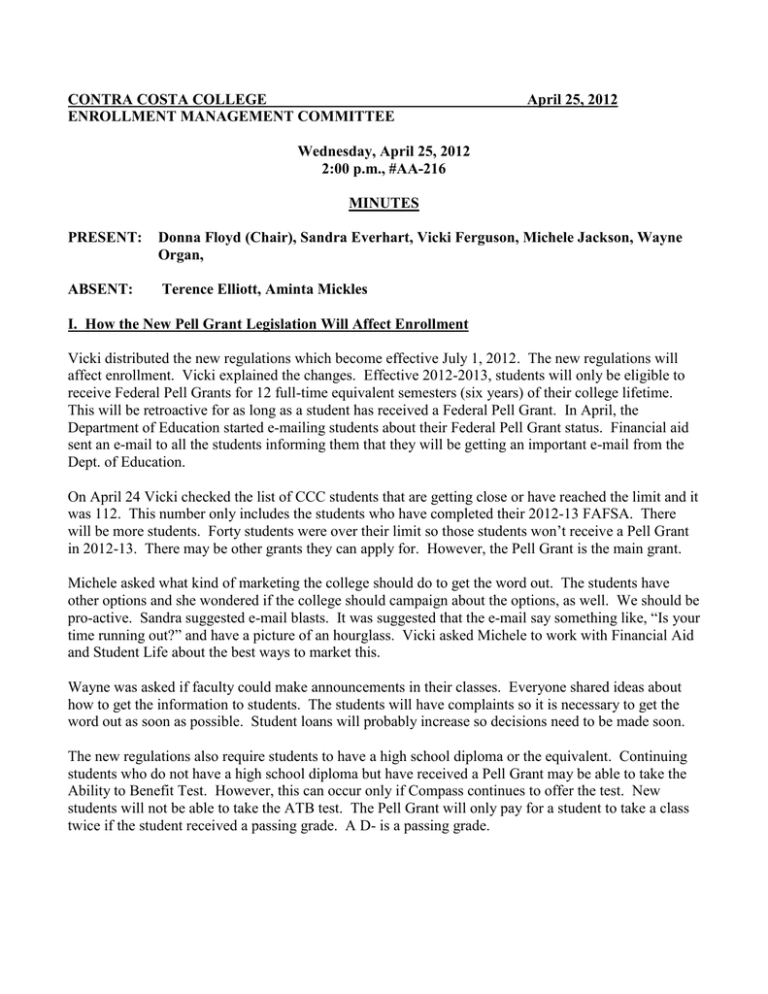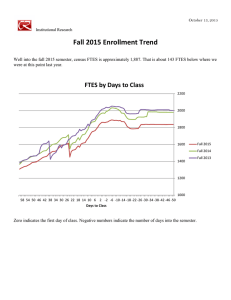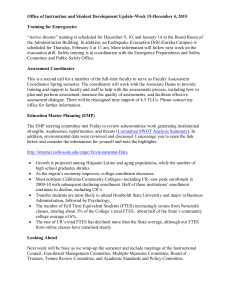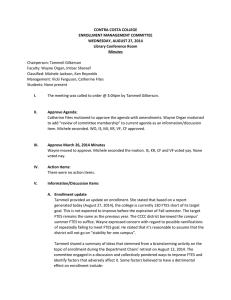EnrollApril252012.Min.doc
advertisement

CONTRA COSTA COLLEGE ENROLLMENT MANAGEMENT COMMITTEE April 25, 2012 Wednesday, April 25, 2012 2:00 p.m., #AA-216 MINUTES PRESENT: Donna Floyd (Chair), Sandra Everhart, Vicki Ferguson, Michele Jackson, Wayne Organ, ABSENT: Terence Elliott, Aminta Mickles I. How the New Pell Grant Legislation Will Affect Enrollment Vicki distributed the new regulations which become effective July 1, 2012. The new regulations will affect enrollment. Vicki explained the changes. Effective 2012-2013, students will only be eligible to receive Federal Pell Grants for 12 full-time equivalent semesters (six years) of their college lifetime. This will be retroactive for as long as a student has received a Federal Pell Grant. In April, the Department of Education started e-mailing students about their Federal Pell Grant status. Financial aid sent an e-mail to all the students informing them that they will be getting an important e-mail from the Dept. of Education. On April 24 Vicki checked the list of CCC students that are getting close or have reached the limit and it was 112. This number only includes the students who have completed their 2012-13 FAFSA. There will be more students. Forty students were over their limit so those students won’t receive a Pell Grant in 2012-13. There may be other grants they can apply for. However, the Pell Grant is the main grant. Michele asked what kind of marketing the college should do to get the word out. The students have other options and she wondered if the college should campaign about the options, as well. We should be pro-active. Sandra suggested e-mail blasts. It was suggested that the e-mail say something like, “Is your time running out?” and have a picture of an hourglass. Vicki asked Michele to work with Financial Aid and Student Life about the best ways to market this. Wayne was asked if faculty could make announcements in their classes. Everyone shared ideas about how to get the information to students. The students will have complaints so it is necessary to get the word out as soon as possible. Student loans will probably increase so decisions need to be made soon. The new regulations also require students to have a high school diploma or the equivalent. Continuing students who do not have a high school diploma but have received a Pell Grant may be able to take the Ability to Benefit Test. However, this can occur only if Compass continues to offer the test. New students will not be able to take the ATB test. The Pell Grant will only pay for a student to take a class twice if the student received a passing grade. A D- is a passing grade. Enrollment Management Committee April 25, 2012 Michele displayed the academic calendar which had been blown up and all important dates were easy to read. Michele is investigating the possibility of getting some enlarged calendars laminated so they can be posted in the AA-Bldg. and other areas around campus. II. New Repeatability Rules Vicki was unable to get the numbers of students that the new repeatability rules will affect. She asked Wayne and he said this really only affects athletics and performing arts. Wayne went on to explain that the state doesn’t define what a “family” of courses is so it’s up to the college to determine. There are only four classes that can be taken in a family. The auditors can say the college defined a family incorrectly and say the college owes the state a lot of money. Wayne would like the college to ascertain what the auditors define as a “family”. Performance classes can be taken four times. However, different types of piano classes aren’t performance classes. They all fall in the same family and can only be taken four times. There was a discussion about how to find out how many students this affects, and who those students are. Donna suggested Vicki get the counselors’ input . Donna said on a case-by-case basis, the college can allow students to repeat a class more than four times, but no apportionment would be received. These rules would apply to students district-wide. Students can go to other districts and take an equivalent course. The new repeatability rules will have a first read in May, a second read in July, and then go to the Department of Finance. This could be implemented in fall 2013. Counseling is taking a leadership role in implementing these changes and informing students, thanks to Dionne Perez’ guidance. III. Review Registration Priorities Donna referred everyone to the handout showing the new registration priorities. She explained the process for developing the new priorities. They were developed so that DSPS note-takers could have priority registration if they were note-takers in the previous semester. The state is proposing that foster youth and veterans be included in the first group. New and continuing fully matriculated, DSPS, and EOPS students would be in the second group. The state task force is still working on the priorities so it may change. IV. 2012-13 FTES Donna said the summer schedule is considerably less than last summer, by 150 FTES. There were 663 FTES last summer. We’re projecting 521 FTES for summer 2012. The FTES goal is lower this year compared to last year. One enrollment strategy is to scale back summer so the fall schedule could have more sections. Whether or not the tax initiative passes will greatly affect the spring 2013 schedule. Classes will either have to be cut or added, so there will be three schedules prepared so they will be ready to go in either event. The district FTES goal is lower as well. There is a lot of uncertainty right now. 2 Enrollment Management Committee April 25, 2012 V. Continue to Review the Enrollment Management Plan: College Objective 3, Page 4 This agenda item was tabled. The meeting adjourned at 3:25 p.m. Minutes Recorded by Mary Healy EnrollFeb222012.Min 3



